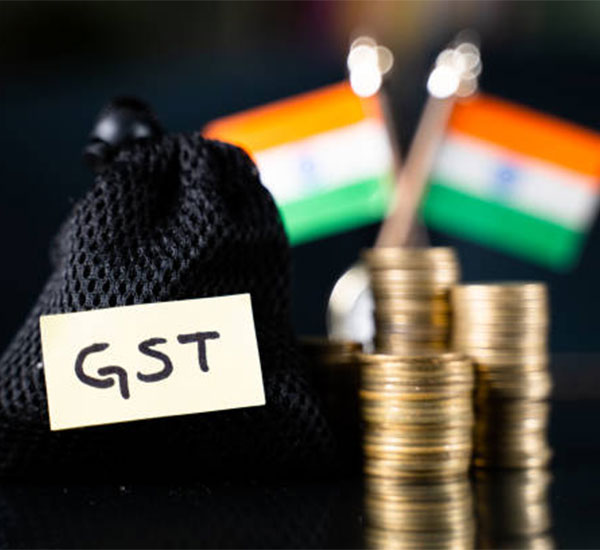
What We Offer
Key Features For Our GST Registration
The Goods and Services Tax (GST), which went into effect on July 1, 2017, affects all Indian service
providers (including independent contractors), retailers, and manufacturers. The GST is an
accumulation of a number of central taxes, including Service Tax, Excise Duty, CST, and state taxes,
including Entertainment Tax, Luxury Tax, Octroi, and VAT. Additionally, to avoid cumbersome GST
requirements and pay GST at a fixed rate of turnover, taxpayers with a turnover of less than 1.5
crore can select a composition scheme.
Along the supply chain, every product goes through a number of steps, including buying the raw
materials, manufacturing, selling to the wholesaler, selling to the retailer, and then selling to
the customer. It's interesting to note that GST will be applied to all 3 levels. Let's assume that
if a product is made in West Bengal but used in Uttar Pradesh, all of the proceeds will go to that
state. Advantages of GST Registration are:
Table Of Contents
Know Everything About GST Registration

Company Registration Process
What Are the Components of GST?
GST has three tax components, namely:
- Central Goods and Services Tax or CGST, it is a central government
- State Goods and Services Tax or SGST which is a state component. Where centre and state will levy GST on all entities for all the transaction in the state
- The Integrated Goods and Services Tax (IGST), to be levied by the centre, i.e. when a transaction happens from one state to another.
Mandatory Documents For Online GST Registration
The list of documents required for registration of GST for various business are as follows:
Proprietorship
- PAN Card and address proof of proprietor
LLP
- PAN Card of LLP
- LLP Agreement
- Partners’ names and address proof
Private Limited Company
- Certificate of Incorporation
- PAN Card of Company
- Articles of Association, AOA
- Memorandum of Association, MOA
- Resolution signed by board members
- Identity and address proof of directors
- Digital Signature
The Following Can Be Shown as Proof of Address of a Director
- Passport
- Voter Identity Card
- Aadhar Card
- Ration Card
- Telephone or Electricity Bill
- Driving License
- Bank Account Statement
Add what works as identity proof, One can use a PAN Card, Aadhar Card as identity proof. For address proof, any of the director’s can show their voters ID, passport, telephone bill, electricity bill and telephone bill.
GST Registration Process
Step 1: To apply GST Registration Online, visit the GST portal and select ‘New GST Registration’Step 2: Fill in the necessary details like name of business, state, pan card details, etcStep 3: Enter the OTP and click proceedStep 4: Make a note of the Temporary Reference Number(TRN)Step 5: Check the GST portal and select ‘Register’ in the ‘Taxpayers’ menuStep 6: Enter the TRN and proceedStep 7: Enter the OTP received on your registered mobile number or your email and then proceedStep 8: You can check the status of your application on the next pageStep 9: Fill in the necessary details and upload the necessary documentsStep 10: Submit your application after verifying by one of the three methods givenStep 11: After completion, you will receive the Application Reference Number(ARN) on your registered mobile number and email idStep 12: Now you can access the status of the ARN on the GST portal.
After successful registration, you will get your GST registration certificate and GSTIN after verification of the GST application and other mandatory GST registration documents by the GST officer. Be aware that no hard copies of the certificate will be issued and the GST certificate can be downloaded from the GST Portal.
Who Needs a GST Registration Service?
- Any individual or business entity that carries out taxable supplies of goods or services
- Annual turnover of the business exceeds the prescribed threshold limit (currently ₹20 lakhs for most businesses)
- E-commerce operators that facilitate the supply of goods and services through their platform
- Non-resident taxable persons who occasionally supply goods or services in India
- Businesses that are involved in inter-state supply of goods or services
- Input service distributors who distribute input tax credit to their branches or units
- Casual taxable persons who supply goods or services occasionally in India
- Businesses that were previously registered under the old tax regime (VAT, Service Tax, etc.) and have migrated to GST.
What is a GST Certificate?
A GST Certificate is a document issued by the Indian government to businesses registered under the Goods and Services Tax (GST) system. It serves as proof of the business's registration under GST and includes details such as the business's GST identification number, name, and address. Businesses are required to have a GST Certificate to be able to charge and collect GST from customers. It is also used for various other purposes such as availing input tax credits, applying for loans and participating in tenders.
What Are the GST Tax Rates?
Goods and Services Tax (GST) is a value-added tax that is levied on the supply of goods and services in India. The GST tax rates in India are as follows:
- 0% - This rate is applicable for essential items such as food grains, fresh vegetables, and medical supplies.
- 5% - This rate is applicable for items such as processed food, packaged food, and some household items.
- 12% - This rate is applicable for items such as mobile phones, laptops, and television sets.
- 18% - This rate is applicable for items such as air conditioners, refrigerators, and washing machines.
- 28% - This rate is applicable for items such as luxury cars, tobacco, and aerated beverages.
In addition to these rates, there are some special rates that are applicable to specific goods and services. For example, gold is taxed at 3%, while crude oil and natural gas are taxed at 6%. GST is also levied on services such as telecom, insurance, and banking at the rate of 18%.
It's important to note that GST rates are subject to change and may vary depending on the type of goods or services being supplied. It's always a good idea to check the current GST rates before making a purchase or offering a service.
You can see the tax rates for all the products here: https://cbec-gst.gov.in/gst-goods-services-rates.html
Check out the GST calculator, which comes in handy to calculate the Goods and Service Tax using different slabs.
Benefits of GST Registration
The following are some of the advantages of GST registration:
Bank Loans: GST registration and GST return filing serve as proof of business activity and create track record for a business. Banks and NBFCs lend to businesses based on GST return data. Hence, GST registration can help you formalize your business and get credit.
Supplier Onboarding: To become a supplier of reputed companies, GST registration is often times a must during the supplier onboarding process. Hence, GST registration can help you get more business.
eCommerce: GST registration is a must to sell online and through various platforms like Amazon, Flipkart, Snapdeal, Zomato, Swiggy, etc., Hence, having a GST registration will allow you to sell online.
Input Tax Credit: Entities having GST registration are eligible to collect GST from customer for the supply and offset the liability against GST taxes paid while purchasing various goods and services. Hence, GST registration can help you save on taxes and improve margins.

Find Your Answers About GST Registration
Fill The Form to Get Started
Fill The Form to Avail Our Services








